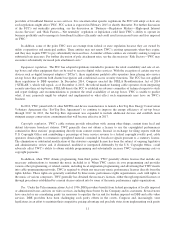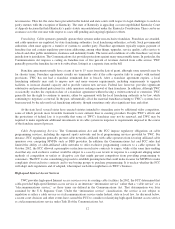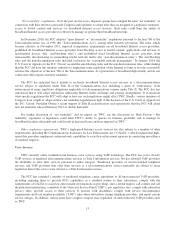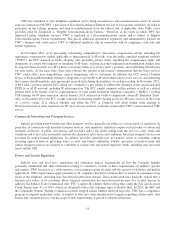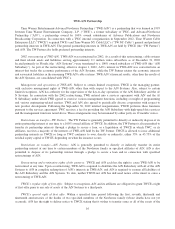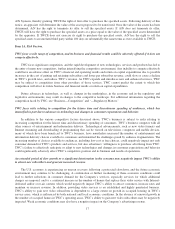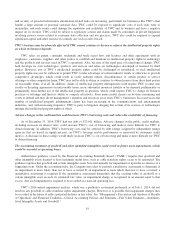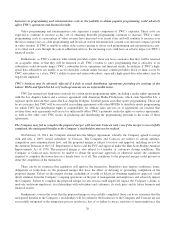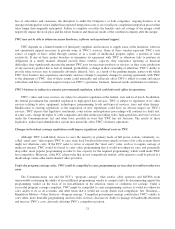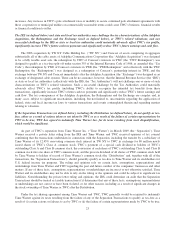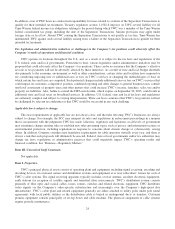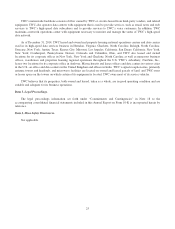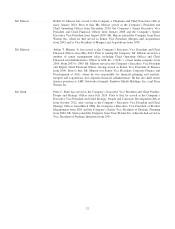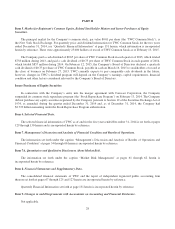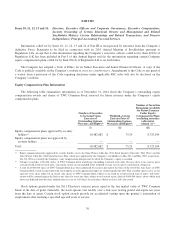Time Warner Cable 2014 Annual Report Download - page 28
Download and view the complete annual report
Please find page 28 of the 2014 Time Warner Cable annual report below. You can navigate through the pages in the report by either clicking on the pages listed below, or by using the keyword search tool below to find specific information within the annual report.Increases in programming and retransmission costs or the inability to obtain popular programming could adversely
affect TWC’s operations and financial results.
Video programming and retransmission costs represent a major component of TWC’s expenses. These costs are
expected to continue to increase as the cost of obtaining desirable programming continues to increase. TWC’s video
programming costs as a percentage of video revenue have increased over recent years and will continue to increase over
the next coming years as cable programming and broadcast station retransmission consent cost increases outpace growth
in video revenue. If TWC is unable to adjust video service pricing to offset such programming and retransmission costs,
or to offset such costs through the sale of additional services, the increasing cost could have an adverse impact on TWC’s
financial results.
Furthermore, as TWC’s contracts with content providers expire, there can be no assurance that they will be renewed
on acceptable terms or that they will be renewed at all. TWC’s failure to carry programming that is attractive to its
subscribers could adversely impact TWC’s subscriber levels, operations and financial results. In addition, if TWC’s high-
speed data subscribers are unable to access desirable content online because content providers block or limit access by
TWC subscribers as a class, TWC’s ability to gain and retain subscribers, especially high-speed data subscribers, may be
negatively impacted.
TWC’s business may be adversely affected if it fails to reach distribution agreements providing for carriage of the
Lakers’ RSNs and SportsNet LA or if such agreements are on unfavorable terms.
TWC has entered into long-term contracts for certain sports programming rights, including a media rights agreement
with the Los Angeles Lakers and a services agreement with American Media Productions, which owns SportsNet LA, a
regional sports network that carries the Los Angeles Dodgers’ baseball games and other sports programming. There can
be no assurance that TWC will be successful in reaching agreements with other MVPDs to distribute sports programming
for which TWC has distribution rights or responsibility for affiliate sales services or, if agreements are reached, that
revenue from such agreements will exceed or sufficiently offset TWC’s payments under the rights or services agreements,
as well as the other costs TWC incurs in producing and distributing the programming pursuant to the terms of these
agreements.
The Company may fail to complete the proposed merger with and into Comcast and, even if the merger is successfully
completed, the anticipated benefits to the Company’s stockholders may not be realized.
On February 12, 2014, the Company entered into the Merger Agreement, whereby the Company agreed to merge
with and into a 100% owned subsidiary of Comcast. The Company and Comcast are subject to certain antitrust,
competition and communications laws, and the proposed merger is subject to review and approval, including review by
the Antitrust Division of the U.S. Department of Justice and the FCC and approval under the Hart-Scott-Rodino Antitrust
Improvements Act of 1976. The proposed merger is also subject to a number of customary closing conditions. The
Company or Comcast may, however, be unable to obtain the necessary approvals or otherwise satisfy the conditions
required to complete the transaction on a timely basis or at all. The conditions to the proposed merger could prevent or
delay the completion of the transaction.
There can be no assurance that regulators will approve the transaction. Regulators may impose conditions, terms,
obligations or restrictions on the proposed merger that have the effect of delaying or preventing completion of the
proposed merger. Delays in the merger closing, including as a result of delays in obtaining regulatory approval, could
divert attention from the Company’s ongoing operations on the part of management and employees and adversely impact
the Company. Failure to complete the proposed merger for any reason could negatively impact the Company’s ability to
motivate and retain employees, its relationships with subscribers and customers, its stock price and its future business and
financial results.
Furthermore, even in the event that the proposed merger is successfully completed, there can be no assurance that the
anticipated benefits to the Company’s stockholders will be realized if the businesses of the Company and Comcast are not
successfully integrated or the integration process results in a loss of or failure to attract, motivate or retain employees, the
20



